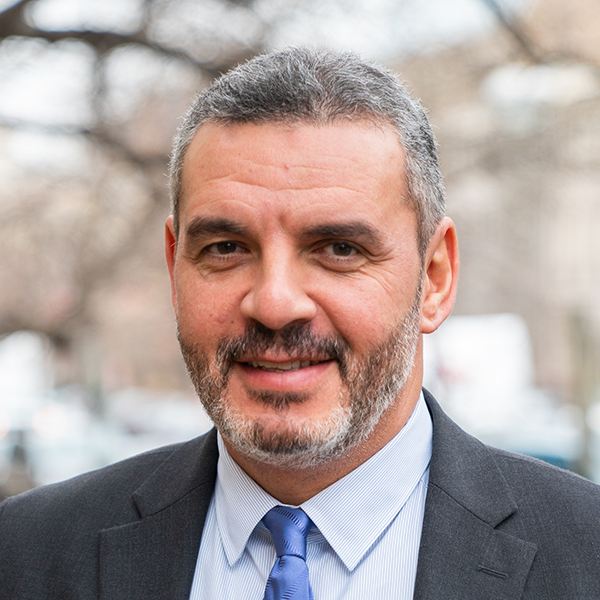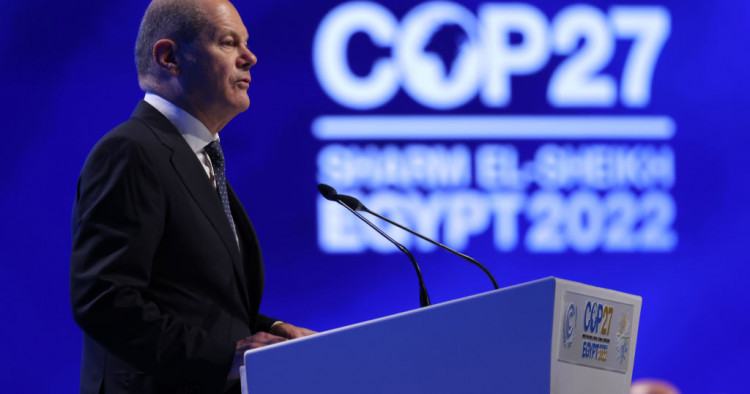Contents:
- COP27 kicks off with good news, but there’s a long struggle ahead
- Netanyahu set to lead the most right-wing government in Israel’s history
- A failed assassination could help break Pakistan’s political impasse
- Crisis-wracked Lebanon needs a new president and government
COP27 kicks off with good news, but there’s a long struggle ahead
Mirette F. Mabrouk
Senior Fellow and Founding Director of the Egypt program

-
After negotiations that labored well into the night and the following morning, the contentious issue of loss and damage for victims of climate change effects was put on the official agenda of COP27.
-
But developing nations are worried that developed ones are prepared to backslide on their commitments.
Considering the continually rising stakes that have come with successive United Nations Conference of the Parties (COP) meetings on climate change, it isn’t surprising that they have tended to be fraught with tension. This year’s COP, being held in the Egyptian seaside resort of Sharm el-Sheikh, comes on the heels of multiple extreme weather events and a global economic downturn exacerbated by the ruinous Russian invasion of Ukraine. It may prove to be the toughest COP yet.
Somewhat surprisingly for a climate change conference, COP27 kicked off with some good news. After negotiations that labored well into the night and the following morning, the issue of loss and damage for the victims of climate change-induced crises was put on the official agenda. Egypt has been consistent in its messaging on climate justice, and Foreign Minister Sameh Shoukry, the conference’s current president, said this agreement “creates for the first time an institutionally stable space on the formal agenda of the COP and the Paris Agreement to discuss the pressing issue of funding arrangements needed to deal with existing gaps in responding to loss and damage.”
The issue has been a deeply contentious one over the past decade. It refers to developed countries providing financial assistance to developing ones to help combat the effects of climate change, for which the latter bear little to no responsibility. The entire continent of Africa, for example, which is immensely vulnerable to climate change, contributed a mere 3.8% to global emissions in 2020. Loss and damage has been strenuously resisted by many developed nations because it opens up a dangerous door to reparations — never a topic that countries want to face, regardless of how healthy their economies are. And this year, amid a global economic downturn and galloping inflation, the conversation is even more difficult. Little of the $100 billion a year in funding for climate action that developed nations promised to provide to developing ones at COP15 in 2009 has materialized — the latest figures produced by the Organization for Economic Cooperation and Development (OECD) show that while almost $83 billion was mobilized in 2020, the bulk went to “mitigation in relatively high-emitting countries” rather than the developing countries that so badly need it. That disparity comes sharply into focus when one considers that the Earth is now well and truly entrenched in a climate crisis. A report by the U.N.’s World Meteorological Organization noted that the last eight years were the hottest on record, that European glaciers suffered especially badly, and that the Greenland ice sheets, which together with those in Antarctica store about two-thirds of the Earth’s fresh water, lost mass for the 26th consecutive year. According to the organization’s secretary general, Petteri Taalas, the 2015 Paris Agreement’s maximum 1.5°C warming goal is now “barely within reach.”
And that’s before the current economic conditions are taken into account. Developing nations are worried that developed ones are prepared to backslide on their commitments. The war in Ukraine and Russia’s cutting of natural gas deliveries to Europe meant that countries like Germany have resorted to the world’s dirtiest fossil fuel: coal. Even last year’s host of COP, the United Kingdom, which formally handed the agenda over to Egypt during the opening of COP27, appeared to be backsliding with vigor. Short-lived former Prime Minister Liz Truss was in power just long enough to restart fracking in the U.K., offer new offshore drilling licenses in the North Sea, and “advise” King Charles III, a highly respected environmental campaigner for over 50 years, not to travel to COP27. Her successor, Rishi Sunak, also said that he would not attend but ultimately seems to have been persuaded to do so by the terrible optics of the previous host nation sitting out the current meeting and, apparently, by the fact that a predecessor, Boris Johnson, was attending.
Although the climate conference is off to a good start and the Egyptian hosts have gone to great lengths to champion the cause of developing nations and to put climate justice squarely on the table (not to mention the sheer effort of putting on a conference with 45,000 people, 196 countries, and 120 heads of state), the good work threatens to be overshadowed by the spotlight on the country’s human rights record. As COP27 kicked off, one of Egypt’s best-known political prisoners, Alaa Abdel Fattah, ramped up his hunger strike — he stopped taking water on Sunday. The international condemnation is unlikely to have any effect whatsoever on the Egyptian government, which has never responded well to what it views as foreign interference in its domestic affairs. However, if Egypt is serious about pursuing the kind of future for its citizens that it says it wants, then the issue of its political prisoners must be squarely addressed. Security and stability have always been stated priorities, but it will be impossible to ensure lasting security or stability without freedom: freedom of expression, freedom of assembly, and freedom of political association. Egypt should address this issue, not because of any international pressure, but because, as with tackling climate change, ultimately it is in its own interest.
Follow on Twitter: @mmabrouk
Netanyahu set to lead the most right-wing government in Israel’s history
Khaled Elgindy
Senior Fellow, Director of Program on Palestine and Palestinian-Israeli Affairs

-
Netanyahu owes his decisive election victory to three factors: the precariousness of the outgoing coalition government, the rapid rise of the Religious Zionism camp, and the failure of two anti-Netanyahu parties to cross the electoral threshold of 3.25%.
-
By casting himself as the relative moderate compared to his more extreme coalition partners, Netanyahu will try to earn himself more latitude from the international community on the basis that only he can keep the true extremists at bay.
After an unprecedented fifth election in less than four years, former Prime Minister Benjamin Netanyahu won a decisive victory in the Nov. 1 Knesset elections, paving the way for Israel’s longest-serving prime minister to return to power. The coalition of right-wing, ultranationalist, and religious parties, headed by Netanyahu’s Likud Party, will command a solid 64-seat majority in the Israeli legislature, putting an end to the crisis that has plagued the country’s politics since 2019 and ushering in the most right-wing government in Israel’s history. Netanyahu and other forces on the right side of the Israeli political spectrum were able to capitalize on the underlying contradictions of the outgoing government of Yair Lapid and Naftali Bennett, an eclectic and highly precarious coalition that included Arab, leftist, centrist, and far-right parties.
Yet Netanyahu owes his electoral victory to two additional factors. The first and arguably most important of these has been the rapid rise of the so-called Religious Zionism camp, a coalition of extremist and Jewish supremacist groups headed by Bezalel Smotrich and Itamar Ben-Gvir, which, together, took 14 seats, making it the third-largest bloc in the Knesset and the linchpin of the Netanyahu coalition. Ben-Gvir’s Otzma Yehudit (Jewish Power) party is an offshoot of the once banned Kach party, founded by the late extremist rabbi Meir Kahane. Nevertheless, Ben-Gvir, who has openly called for the expulsion of Palestinians, including those who are Israeli citizens, and was himself convicted of racist incitement, is likely to become a minister in the new Netanyahu government. The second favorable factor was the failure of two anti-Netanyahu parties, the leftist Meretz Party and the Arab-dominated Balad Party, to cross the electoral threshold of 3.25%, which helped cement Netanyahu’s victory while underscoring the evisceration of the Israeli left and the political fragmentation of the Arab electorate.
The agenda of the incoming far-right coalition is likely to focus inward, at least in the short term, starting with Netanyahu’s own ongoing corruption trial, which he has dismissed as a “witch hunt.” The new cabinet is also expected to take aim at the judiciary more broadly along with the education curriculum and “culture war” issues like LGBTQ+ rights. The conventional wisdom is that the traditionally cautious Netanyahu will tread lightly in the foreign policy and security realms, if only to avoid disrupting ties with the United States and other Western countries, not to mention Israel’s newfound Arab allies of the Abraham Accords. This cautiousness may not extend to the Palestinians and the Occupied Territories, however, which in the context of Israeli politics at least are viewed as domestic rather than foreign policy issues.
All this is particularly likely to come to pass with the likes of Ben-Gvir and Smotrich in the government. Indeed, if the past is any indication, Netanyahu will presumably use his far-right flank to deflect any would-be pressure from the U.S. and the West on issues like settlement expansion or Israeli army violence against Palestinians. By casting himself as the (relative) moderate, Netanyahu will try to earn himself more latitude on the basis that he — and only he — can keep the true extremists at bay. To this end, Netanyahu is betting on two things. The first is a Republican takeover of one or both houses of Congress — just enough to provide him a cushion (or cudgel) against potential pressure from the administration. It is worth recalling the days when Republicans accused President Barack Obama of throwing Israel “under the bus.” Netanyahu’s second wager is that President Joe Biden, who is far more sentimental and deferential toward Israel than Obama was, will remain firm in his opposition to applying any type of pressure on Israel. Based on recent trends, the next Israeli prime minister is likely to be right on both counts.
Follow on Twitter: @elgindy_
A failed assassination could help break Pakistan’s political impasse
Marvin G. Weinbaum
Director, Afghanistan and Pakistan Studies

-
The growing threat of violence in Pakistan may incline former Prime Minister Khan and the ruling coalition to find a compromise.
-
The Pakistani military has a deep institutional stake in finding an early resolution to the political standoff.
Former Prime Minister Imran Khan’s long march, already a high-stakes contest between his populist movement and Pakistan’s ruling party coalition, turned more intense last week. The shooting of the former prime minister in a failed assassination attempt on Nov. 3 has unleashed a wave of violent demonstrations as Khan’s supporters take out their anger against political enemies and civil authorities. The attack strengthens Khan’s claims that his enemies will go to any lengths to keep him and his party, Pakistan Tehreek-e-Insaf (PTI), from being restored to power. Khan has lost no time in naming the current prime minister, Shehbaz Sharif, among others, as being behind the shooting. Never mind that the alleged shooter turned out to be a religious fanatic and is unlikely to be part of any government plot. Khan, who credits Allah for his survival, has in the eyes of many Pakistanis revealed his possession of divine blessing (baraka) in his stated mission to save Pakistan from corrupt politicians and foreign scheming.
But the violent act that took one life and injured several PTI luminaries may also have hastened the breaking of an impasse over setting a date for national elections. With Khan declaring his readiness to have his party’s caravan to Islamabad resume, Pakistan faces the prospect that prolonged political turmoil will drive an economically tottering country into debt default and bankruptcy. With this threat looming, both political camps may be inclined to finally find a compromise. Each has left open the door to negotiations that could lead to an agreement to hold elections some months before next August’s scheduled contests but not nearly as early as Khan has argued for. A more confident Khan may now be willing to allow for a delay without fear of his movement losing steam. Even so, arriving at any compromise may be difficult without the agency and prodding of the military.
On the surface, the military would seem to have no possible role as arbiter. Its ability to act as an honest broker has been badly tarnished by the continuing exchange of public invective with Khan. Once closely aligned with the military, the PTI blames army chief Gen. Qamar Javed Bajwa, in particular, for the falling out that led to Khan’s ouster by parliament in April. However, with the general’s retirement this month and selection of a new chief, the often-contentious issue of filling this most powerful post will have passed. Tellingly, although Khan has sought to link the military to the attempt on his life, he now lays the blame on “black sheep” in its ranks and not the top brass.
The military, which remains for Pakistan the entity of last resort for holding the country together, has a deep institutional stake in finding an early resolution to the political standoff. For it to adopt a strictly hands-off policy would mean not only the threat of increasing violence but also the possibility that Khan’s strengthening, increasingly frustrated protest movement may turn toward extra-constitutional means to acquire power. To be sure, the upcoming elections, which the PTI seems almost certain to sweep, do carry a risk that Khan, emboldened by a massive popular mandate, could leave the military as a weakened institution. But it may be a risk the military is willing to take to avoid possibly having to declare emergency rule and Pakistan being sanctioned by much of the international community.
Shizah Kashif, a research assistant to Marvin G. Weinbaum, assisted with the production of this article.
Follow on Twitter: @mgweinbaum
Crisis-wracked Lebanon needs a new president and government
Fadi Nicholas Nassar
U.S.-Lebanon Fellow

-
Michel Aoun’s presidency concluded at the end of October with the Lebanese parliament unable to elect a successor.
-
Lebanon is now left with both a presidential vacuum and a caretaker cabinet with limited authority.
Lebanon’s constitution gives the parliament the responsibility for electing the president of the republic. It stipulates that in the first round of elections, a qualified majority of two-thirds is needed. In the absence of such a threshold being met, subsequent rounds require only an absolute majority.
Since the start of presidential elections in September, the country’s hung parliament held four sessions to elect a successor to the incumbent head of state, Michel Aoun, each ending with no clear victor. Aoun’s six-year term in office concluded at the end of October. While the speaker of the parliament, Nabih Berri, has called for election sessions once a week every week until a new president is elected, the fragmentation in the parliament suggests a drawn-out process is in store. The last presidential vacuum, before Aoun’s election, lasted nearly two and half years, from May 2014 until October 2016.
The current presidential void is also occurring in a context in which the prime minister-designate, Najib Mikati, has been unable to form a government for nearly half a year. Amidst Lebanon’s double vacuum, the absence of clarity or consensus over the distinct authority of the caretaker cabinet risks further destabilizing the crisis-hit country and undermining any meaningful implementation of reforms.
This gap at the top is crystalizing at a moment when decisive leadership is most needed. Following the economic meltdown of 2019, Lebanon’s currency has lost more than 95% of its value and poverty risen to more than 80% in the former middle-income economy.
Against the backdrop of a three-year crisis and ongoing negotiations with the International Monetary Fund (IMF), Lebanon is left with neither a president nor a government, led instead by a caretaker cabinet and an increasingly paralyzed legislature.
Photo by Sean Gallup/Getty Images
The Middle East Institute (MEI) is an independent, non-partisan, non-for-profit, educational organization. It does not engage in advocacy and its scholars’ opinions are their own. MEI welcomes financial donations, but retains sole editorial control over its work and its publications reflect only the authors’ views. For a listing of MEI donors, please click here.













